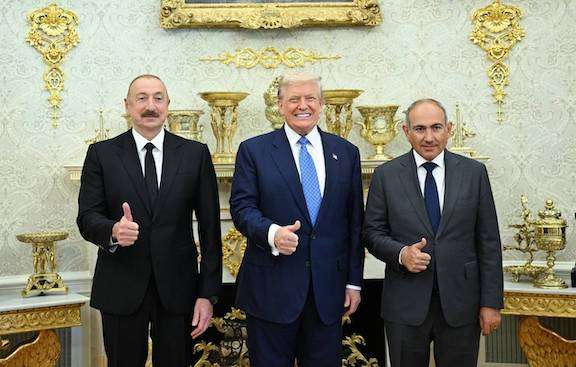Lemkin Institute Warns of War and Genocide Risks in ‘Peace Deal’

The Lemkin Institute for Genocide Prevention and Human Security issued a statement on the Armenia-Azerbaijan agreement signed at the White House last month, warning that the “deal” could lead to resumption of military aggression and poses a threat of genocide against Armenians in the South Caucasus.
“What the agreement does not address is the ongoing genocidal nature of the dictatorship of President Ilham Aliyev in Azerbaijan, Azerbaijan’s ongoing occupation of Armenian territory, the fate of Armenian cultural heritage, the status of the Republic of Artsakh/Nagorno-Karabakh (a de facto state before Azerbaijan’s 2023 genocide of the Armenian community in the region), the rights of displaced Armenians from Artsakh/Nagorno-Karabakh, the fate of the Armenian POWs and former political leadership of Artsakh in Azerbaijani prisons, or mechanisms for addressing past human rights violations,” the statement said.
Below is the text of the Lemkin Institute statement.
The Lemkin Institute for Genocide Prevention and Human Security expresses mounting frustration and continuing concern about the threat of genocide against Armenians in the South Caucasus region in the wake of what is being uncritically heralded worldwide as a “peace deal” between Armenia and Azerbaijan. While we welcome any diplomatic steps that may reduce the risk of renewed armed conflict in the region, those steps must be real and have the prospect of leading to a just and sustainable peace. The current media and diplomatic reception of the joint declaration brokered by U.S. President Donald Trump is a premature celebration of peace while Azerbaijan’s recent mass atrocity crimes and consistent belligerence remain unaddressed. In fact, the deal being announced could easily lead to more war and destruction and could lay the groundwork for further genocidal actions by Azerbaijan towards Armenians. Concrete mechanisms to protect Armenian sovereignty must be incorporated into the text of the agreement and manifested in the material world before this peace agreement can in fact guarantee peace.
As the Lemkin Institute and other human rights organizations have repeatedly warned, Azerbaijan is a genocidal state that committed genocide against Armenians of Artsakh (Nagorno-Karabakh) between 2020 and 2023, using killing, life force atrocities, blockade, starvation, forced displacement, and cultural destruction. In September 2023 it destroyed the entirety of the over 3000 year old Artsakh Armenian community in only a few days. Azerbaijan’s brutal military assaults on Armenians – which have included ISIS-style beheadings, brutal tortures, and genocidal humiliations all celebrated on videos shared through social media – are supported by Turkey, a state that has never taken responsibility for the total genocide against Armenians in World War I, and by the genocidal state of Israel, which uses Azerbaijan for oil, diplomatic cover in the Middle East, and military operations against its enemy, Iran. Any deal with Azerbaijan that does not address these pronounced genocidal threats will end up enabling them. In the worst case scenario, Armenia could cease to exist as a sovereign state.
On 8 August 2025, Armenian Prime Minister Nikol Pashinyan and Azerbaijani President Ilham Aliyev met at the White House, where they signed a Joint Declaration and initiated — without formally signing — the Agreement on Establishment of Peace and Inter-State Relations. The meeting was brokered by U.S. President Donald Trump with support from senior U.S. diplomats. In its current form, the Agreement is not a binding peace treaty but rather a preliminary memorandum outlining intentions. The initial signing signifies agreement in principle on the text, but the accord has not yet entered into force; it still requires formal signing and ratification by both governments.
On paper the agreement outlines the normalization of diplomatic relations between Armenia and Azerbaijan, mutual recognition of territorial integrity, and commitments to open transport links, including, very importantly, a new transit corridor through Armenia connecting Azerbaijan to its exclave of Nakhichivan. It also includes provisions on border delimitation, security guarantees, the return of missing and disappeared persons, and cooperation in regional trade. As foreign policy expert Eldar Mamedov noted in Responsible Statecraft, many of these vague provisions are a reworking of the principles of the 1975 Helsinki Accords and the 1991 Almaty Declaration.
What the agreement does not address is the ongoing genocidal nature of the dictatorship of President Ilham Aliyev in Azerbaijan, Azerbaijan’s ongoing occupation of Armenian territory, the fate of Armenian cultural heritage, the status of the Republic of Artsakh/Nagorno-Karabakh (a de facto state before Azerbaijan’s 2023 genocide of the Armenian community in the region), the rights of displaced Armenians from Artsakh/Nagorno-Karabakh, the fate of the Armenian POWs and former political leadership of Artsakh in Azerbaijani prisons, or mechanisms for addressing past human rights violations.
In fact, regarding the latter, the joint declaration directly undermines efforts to address past human rights violations by forcing Armenia to withdraw its current cases against Azerbaijan at international courts. Currently, both Armenia and Azerbaijan have pending cases at the International Court of Justice (ICJ) and the European Court of Human Rights (ECtHR). Armenia’s ICJ case, filed on September 16, 2021, accused Azerbaijan of violations of the International Convention on the Elimination of All Forms of Racial Discrimination (ICERD) in its official rhetoric, its educational system, its policies towards the Armenians in Azerbaijan, its horrific atrocities during the 2020 war in Artsakh/Nagorno-Karabakh, and in its ethnic cleaning of Artsakh. In response to the Armenian case, Azerbaijan filed its own case at the ICJ on September 23, 2021 accusing Armenia of similar ICERD breaches. The cases at the ECtHR cover similar issues.
These legal cases are important for peace in the region. They currently constitute the only legal mechanism that could produce some truth and accountability for both Armenia and Azerbaijan in the decades of war and tension around the issue of Nagorno-Karabakh. Armenia – as the victim of Azerbaijani aggression and hate – is in a much stronger legal position. This is why Azerbaijan was so keen to ensure that the cases are dropped as part of this “peace” deal.
If Armenia withdraws its cases alongside Azerbaijan, it will also signal an end to efforts to hold Azerbaijan accountable for the Artsakh Genocide and to find justice for the over 100,000 Artsakh Armenians who were forced from their ancestral homeland in 2023. A justice mechanism that can address the grievances of both Armenia and Azerbaijan is essential to long-term peace. Any peace agreement put up for signature by the Trump Administration should include a planned truth and reconciliation mechanism.
It is important to note that Azerbaijan, in its conduct towards Armenia, has routinely violated legal agreements and international laws, viewing them as applying only to Armenia rather than to itself. For example, Azerbaijan repeatedly refused to comply with the provisional measures issued by the ICJ related to Armenia’s case.
For Azerbaijan, the peace deal serves as a tool to advance its expansionist and anti-Armenian agenda rather than as a genuine pathway to reconciliation. By campaigning for the dissolution of the OSCE Minsk Group, for example, Azerbaijan seeks to cement and normalize the outcome of its genocide in Artsakh/Nagorno-Karabakh. Azerbaijan argues that the Minsk Group, originally established in the 1990s to negotiate a lasting peace in the Nagorno-Karabakh territorial dispute, is no longer relevant, given Azerbaijan’s depopulation of the region through the 2023 genocide. In pressuring Armenia to request that the OSCE dissolve it, Azerbaijan is erasing the only existing diplomatic mechanism recognizing the rights of Artsakh Armenians.
Moreover, by demanding the suspension of Section 907 of the United States Freedom Support Act, which previously prevented the US from offering aid to Azerbaijan as a gross human rights violator, Azerbaijan has ensured the flow of direct aid from the United States, including direct military aid. Although 907 was often waived by US presidents, its existence in the books was a thorn in Azerbaijan’s side. The suspension of 907 is an important PR victory for Azerbaijan, as it will erase one of the few bookmarks of Azerbaijan’s status as a gross human rights violator within US politics.
Azerbaijan’s strategy during the Trump Administration’s peace negotiations is rooted in a history of aggression against Armenians, including the 2020 war over Nagorno-Karabakh, the 2022-2023 blockade of Artsakh, the 2023 military offensive against Artsakh, the detention and torture of Armenian hostages, and ongoing efforts to prevent the return of displaced Armenians to Nagorno Karabakh. President Ilham Aliyev has repeatedly made statements denying Armenia’s right to exist, labeling it a fascist state, and claiming the entirety of Armenian territory as Azerbaijani while employing genocidal rhetoric against Armenians. Everything Azerbaijan has done in the last decade towards Armenia has had the goal of erasing the Armenian identity and territorial presence in the South Caucasus. It is difficult to imagine why this peace deal would be different.
In fact, the ongoing “peace process” – which began after Azerbaijan’s war against Artsakh/Nagorno-Karabakh in 2020 and has existed in various forms throughout Azerbaijan’s aggressions since then – has created a situation in which Azerbaijan can advance its genocidal territorial and political aims while the international community emphasizes the appearance of progress, effectively papering over its prior aggression and incendiary language. By framing the agreement as a diplomatic milestone without addressing Azerbaijan’s hostile stance towards Armenia and Armenians, the deal risks normalizing Azerbaijan’s broader genocidal campaign to erase Armenia and Armenians.
Azerbaijan has already demonstrated its intent to use the deal to weaken the Armenian state and target Armenian sovereignty. Aliyev is demanding, for example, that Armenia change its constitution, claiming that the preamble makes territorial claims to Artsakh/Nagorno-Karabakh, which he considers to be an integral part of Azerbaijan, even though before 2023 it was never governed directly by Baku. As the UCLA Promise Institute has underscored, the people of Artsakh exercised their right to self-determination through the 1991 independence referendum and the subsequent establishment of democratic institutions. Armenia’s constitutional language therefore constitutes a recognition of Artsakh Armenians’ right to freely determine their political status, rather than an unlawful territorial claim. The mere recognition of this right, grounded in international law, may alone explain Azerbaijan’s determination to secure constitutional changes in Armenia. Furthermore, as documented in a 2025 report from the Aram Manoukian Institute, under the doctrine of remedial secession, the persecution experienced by Armenians in Artsakh legitimizes independence as both a lawful and necessary remedy to ensure the survival, rights, and dignity of the people of Artsakh.
The Armenian Constitutional Court has already ruled that only the explicit content of the Armenian constitution carries force, and Artsakh/Nagorno-Karabakh are not mentioned in the text of the Constitution itself. Demanding constitutional changes from Armenia as a requirement for Azerbaijan’s signature of the proposed peace agreement amounts to meddling in Armenia’s internal affairs, which is supposedly proscribed by Article IV of that agreement. Such a demand also imposes a heavy political burden on the Pashinyan government, which is profoundly unpopular at home and would therefore find it difficult to lead the country through a constitutional reform process, especially one that appears to be forced upon voters by a country that has committed genocide against Armenians. Finally, Azerbaijan’s demand protracts the peace process indefinitely, as it is unclear when a constitutional referendum could take place in Armenia. The Pashinyan government has already called for constitutional reform, but such a process would naturally take time. Given all of these obvious obstacles to swift constitutional changes, the Lemkin Institute wonders if President Aliyev’s demand is in fact intended to undermine the peace agreement.
Given that President Aliyev is issuing demands that Armenia must meet before he will sign, Prime Minister Pashinyan could certainly do the same. This “peace deal” need not cater to Azerbaijan in the sycophantic way that previous Western-led efforts have done. Although Armenia is of course the weaker party in these negotiations in terms of military, economic, and geopolitical power, it does own the land through which the planned commercial corridor will run. Armenia has signed a bilateral agreement with the Trump Administration related to the planned corridor and the USA will obviously benefit from this agreement. Nothing should preclude Armenia from publicly presenting its own demands now. Critical issues, including the immediate and unconditional return of prisoners of war and political detainees from Artsakh, reparations for the massive human, territorial, and material losses inflicted by Azerbaijan’s 2020 and 2023 offensives, the return of Armenians to Artsakh, and the urgent protection and restoration of Armenian cultural heritage and destroyed historical sites should be on the table. The omission of these issues – so critical to Armenian security and long-term peace in the region – undermines not only the importance of justice and accountability after mass atrocity but also the very security and survival of Armenian communities in the South Caucasus.
Apart from omitting issues critical to Armenian national security, the peace deal would eliminate third-party deployments along mutual borders (Article VII), which will harm Armenia’s interests and work in favor of Azerbaijan’s. This provision would presumably include Russian forces along Armenia’s border with Iran as well as the EU monitoring mission on the Armenian side of the border with Azerbaijan. Active since 2023, the EU mission in particular has been instrumental in maintaining the ceasefire between Armenia and Azerbaijan and protecting civilian life. It has been able to document Azerbaijan’s many violations of the ceasefire as well as Armenia’s commitment to the ceasefire. Because Azerbaijan is the only country that has committed any documented ceasefire violations, Azerbaijani authorities have of course repeatedly critiqued, threatened, and maligned the EU mission as biased. The withdrawal of this mission is yet another concession which will weaken Armenia’s security position while offering little in return.
The peace deal’s radical reorientation of Armenian security towards the United States poses its own challenges. Despite diplomatic efforts to minimize the implications of the treaty, it does threaten the interests of Russia and Iran, two countries that are important to Armenia’s security and certainly are closer to Armenia geographically than the United States. US interests in the Turkish and Azerbaijani-named “Zangezur Corridor,” which the peace deal would rename the Trump Route for International Peace and Prosperity (TRIPP), are both economic and strategic. The US has had a long-term interest in making headway as an economic and political broker in Central Asia, ensuring that no competing great power gains control of the region. With this new peace deal, the US would secure a monopoly on the development of a corridor leading directly to the Caspian Sea and the mineral wealth of Central Asia (such as uranium, lithium, and rare earth minerals). TRIPP will be a US-controlled corridor to Central Asia, which will allow the US to challenge Russian and Chinese influence in the region as well as the primacy of existing Russian, Iranian, and Chinese trade corridors, especially China’s belt and road infrastructure.
Given that Armenia lost its security broker in the region once it turned away from Russia after the 2018 Velvet Revolution in Yerevan, the increased US material interests in the region that will result from this deal are not necessarily a bad thing for Armenians. However, the United States has taken on an enormous responsibility to defend Armenia against Azerbaijani aggression and ensure Armenian sovereignty. It is not clear that the Trump Administration, much less the US foreign policy establishment, fully understands and takes seriously the threats coming from Azerbaijan.
The Biden Administration’s silence surrounding Azerbaijan’s 2023 genocide in Artsakh demonstrated weak American commitments to international law, justice, and peace in the region – unless that “peace” is a peace of the graveyard forged by a superior military power against a target of its genocidal expansionism. There is no reason to believe that the Trump Administration would respond differently to Azerbaijani aggression, especially if Azerbaijan guarantees that the Trump Administration will benefit from its aggression.
Azerbaijan has a strong model for belligerent behavior in its close ally Israel, whose genocide against Palestinians and threats to take over parts of neighboring countries as part of a “Greater Israel” plan have not significantly altered firm US military and diplomatic commitment to Israel. Moreover, the US has demonstrated time and time again that its interests in a region often result in conflict that does not at all serve the interests of the people living there. The apparent exclusivist US control over the planned corridor could be setting up the South Caucasus to become another theater for the disruptive chaos and mass atrocity that today’s Great Power wrangling is causing all over the globe.
The Lemkin Institute is further alarmed that this “peace” process could be serving even more devastating interests that have nothing to do with peace. The vague language of the proposed peace agreement, and its failure to engage meaningfully with any of the realities on the ground, could suggest that the joint declaration is not intended to result in a genuine peace deal but rather to create the legal framework for something else entirely. With likely Russian and Iranian opposition, and concern from China, the corridor declaration could be nothing short of an effort to secure greater US and Israeli control over Iran’s northern border as they plan for an eventual war to realign the geopolitical realities of the Greater Middle East, no matter the cost to people in the South Caucasus. Azerbaijan, in turn, could be using the declaration as a way to justify renewed hostilities against Armenia, in the same way it has used false accusations of ceasefire violations to justify aggression against Armenia. For example, if Armenia cannot change its constitution quickly enough, or ultimately does not agree to change its constitution to meet Aliyev’s demands, it is not hard to imagine Aliyev proclaiming that Azerbaijan must invade Armenian territory as a matter of “national security.” What fighting force will then come to Armenia’s aid?
Without these issues being addressed, true peace cannot be forged in the South Caucasus. True peace will require serious changes within Azerbaijan, which currently is a state whose leadership has repeatedly employed genocidal rhetoric against Armenians and has pursued policies aimed at erasing the Armenian presence in the region. Changes in Azerbaijan will require changes in Western diplomacy, which has propped up the Azerbaijani dictatorship, granted Aliyev impunity, and normalized his crimes. Such a change in the West would require a serious commitment to genocide prevention, which currently does not exist.
The Lemkin Institute urges President Trump to use his aggressive form of diplomacy to make it worth President Aliyev’s while to take concrete steps towards creating a political environment in which Azerbaijan can be trusted to respect the rights of Armenians and of the Armenian state. One critical step in the right direction would be securing the immediate and unconditional release of all Armenian prisoners and hostages being held in Baku. Such a concession would be a coup for the Trump Administration and could change the balance of power in the region by asserting decisive U.S. leadership. Other efforts to increase trust and goodwill would include reforming Azerbaijan’s anti-Armenian educational system, prohibiting genocidal anti-Armenian language in government, dismantling the “Western Azerbaijan” ideology that lays claim to all of Armenia, and agreeing to negotiations on a future for Artsakh/Nagorno-Karabakh that recognizes the importance of the 3000 year old Armenian presence there. These measures and reforms would be difficult for the Aliyev regime, which has staked much of its popularity on official anti-Armenianism, but it stands to reason that Armenia should not be the only country bearing the burden of difficult political work.
As it stands now the proposed peace treaty appears to be an imposition of Azerbaijan’s genocidal goals towards Armenia onto the U.S. diplomatic framework towards the South Caucasus. The Lemkin Institute is not convinced that the American foreign policy establishment adequately understands the genocidal nature of the Aliyev regime. History warns us of the dangers of appeasing genocidal dictators for short-term gains. The most obvious example is of course Western Europe’s policy of appeasement toward Nazi Germany in the 1930s, most notably the 1938 Munich Agreement that failed to prevent war and instead emboldened further German aggression, leading to catastrophic consequences, including the Holocaust. By allowing the current text of the peace agreement to stand without an effort to include non-negotiable issues related to Armenian security, the Trump Administration risks legitimizing and emboldening Azerbaijan’s expansionist and anti-Armenian agenda and being drawn into yet another genocide.
The Lemkin Institute remains adamant that peace cannot be achieved through genocide. Identity groups need their ancestral lands to keep their cultures and identities alive. Peace agreements that bulldoze through the claims of survivors are unsustainable. That goes for Azerbaijanis who lost their homes during the First Nagorno Karabakh War in the 1990s, but it also goes for Armenians, who have faced genocide from Turkey and Azerbaijan since World War I and who continue to lose territory to these expansionist, genocidal states. We remain committed to the restoration of a free and independent Republic of Artsakh alongside the creation of a world in which the Armenian identity can thrive in safety and security in the Republic of Armenia, the Republic of Artsakh, East Jerusalem, and the Diaspora.





